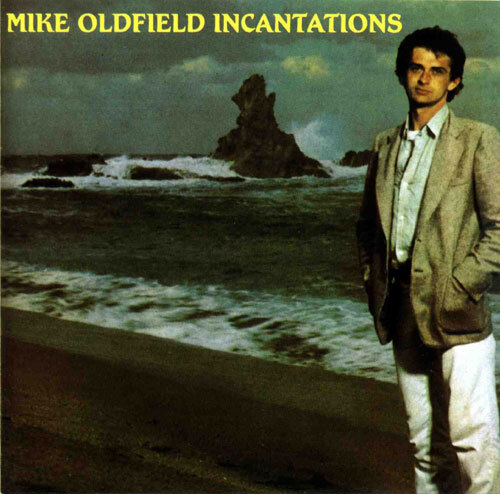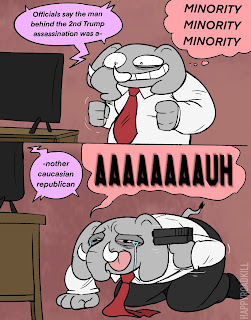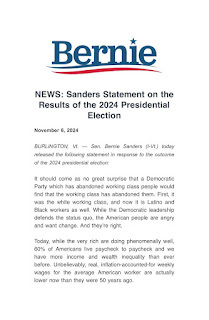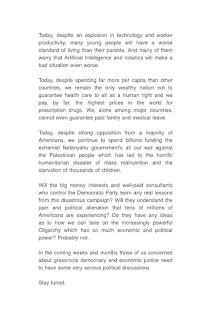James L. Steele's Blog
October 11, 2025
WALL OF TEXT: AMERICAN PROPAGANDA
WALL OF TEXT: AMERICAN PROPAGANDA. Everyone is talking about the murder of Charlie Kirk, but few are talking about what he leaves behind. Turning Point USA is no grassroots movement. Kirk dropped out of college because some millionaires agreed to fund his venture to instill Christian and Capitalist values in college campuses. Yeah, Kirk was funded by millionaires who were concerned that too many college students are questioning capitalism and Christian values and want to fill our heads with propaganda. Where would the rich be if the people started to question why the rich exist in the first place? What would happen if the population started learning about history? Why, the people might start to question why they are working for the benefit of shareholders instead of themselves. These talking points exist to reinforce the idea that we need the rich. The rich give the people so many things, such as employment, so do not question why you need employment in the first place. Turning Point USA is propaganda whose purpose is to protect the social class of its donors. Americans are used to the idea of propaganda coming from the government and no one else. These days it takes on the form of grassroots movements in order to seem spontaneous, but it is not. If you look at who gets put on the air, whose opinions get echoed the most, you will find funding from corporations or the wealthy. It is social engineering not by the government but by the rich. So long as we keep repeating their talking points, we will never question why they are in charge. So what do the people actually want? What is the real Zeitgeist? We have seen this kind of PR for the rich before. The whole reason Santa Claus looks the way he does was to make him resemble a typical robber baron, a big business type of person and we need him to bestow upon us the gift of employment. But do we really need such people? How much of our culture is real, and how much is manufactured rhetoric designed to keep the elites in power? We need to take a serious look at who we listen to, who funds them, and why. If you want a better society, seek information that questions why the elites are in power and what purpose they really serve. Do you want freedom? Then take an honest look at what Capitalism is, and what purpose it serves.




August 27, 2025
WALL OF TEXT: HEALTHY ECONOMY
WALL OF TEXT: HEALTHY ECONOMY. HR told me we got about 600 jobapplications over the past week. The company I work for is hiring,but most of the people they hire just up and quit after a week. Evenif we kept them, we certainly don’t have 600 job openings per week.Everyone is cynical about a new CEO taking over. What’s he going todo to make the line go back up? Probably the same thing the last guydid: push more work onto fewer people. I joked about the CEOreplacing HR with AI. It may not be a joke. I want to change jobs,but my newsfeed is nothing but all the jobs this company is cuttingand that other company is slashing. How many other companies areoverwhelmed with job applications and no positions for anyone? Thisis not a healthy economy. Remember the zombie fad of the 2010s? Ithink we were hoping for a zombie outbreak, cuz we sure knew workinghard wasn’t getting us anywhere, and we craved an equalizer, aworld that has consistent rules which make sense. The Trumpadministration is sending the National Guard to US cities. Trump andVance are outright telling Americans that the cities are socrime-ridden they need the military to keep all these immigrantsunder control. It’s not true. I live in a city, and there is nocrime wave. Immigrants are not committing crimes, but rural Americanswill believe it. This is not a solution. This is a distraction. Ifthe US doesn’t split into 10 warring states within my lifetime,I’ll be stunned. I hope the Bible Belt Alliance doesn’t conquerOhio. I’ll never survive the Inquisition.


June 10, 2025
Decisive Action (short story)
Published in 2022 in Kaleidoscope, Decisive Action might just be the most cynical thing I've ever written, and that's saying a lot. Aliens invade, but we still gotta go to work and forget about uniting in the face of an existential threat. Be sure to stock up on shotguns and ammo so you can defend yourself against the alien death beam.

Decisive ActionBy James L. Steele
Nancy brought her hand down on the alarm clock by her bed and smackedthe snooze button. Six minutes later it whined again in progressivelylouder squeals. She switched the alarm off and rolled out of bed.
The middle-aged woman absently ran her fingers through herhair while she dressed. She then walked through her tiny cityapartment to the living room. Still straightening her hair, sheclicked the power button on the TV remote and walked to the kitchen.The morning news served as background noisewhile she woke up and poured a bowl ofcereal.
“...is still a developing story but we are receiving confirmationfrom around the world and at this point, it seems very likely not tobe a hoax.”
“Michael Trent, reporting from our bureau in Washington, thanks.Again, for those of you just joining us on this Thursday morning,we’re live covering a breaking story that is sure to be a shock tosome viewers. Reports of alien spacecraft in high orbit all over theplanet have been pouring in since two a.m. Central Standard Time.”
The screen cut to a view from the International Space Station. Itclearly showed about two hundred glossy black vessels in orbit aroundthe tiny slice of planet Earth visible in this field of view.Hundreds of equilateral triangles about amile long, almost depthless. No windows, no doors, no obviouscockpit, no room for a pilot. The word “LIVE” was in the top leftcorner of the screen.
“What you are seeing is video we received from overseas. It hasn’tbeen authenticated yet and leaders have not commented on it, butthere are plenty more videos just like it online. And I just receivedword that our cameras are live in the United Nations building in NewYork where leaders are meeting—some of them via the internet—todiscuss what is happening and what should be done about it.”
Nancy was standing in the living room, staring at the TV, bowl ofcereal cradled in both hands. She blinked sixteen times while theanchor announced the most world-shattering event in an undramaticmonotone.
The screen cut to a camera view inside the United Nations. The vastchamber was mostly empty, but some delegates were in their seats.Nancy picked up her cell phone and called work. Her boss answered onthe first ring.
“Thank you for calling—”
“Jeff! It’s Nancy! Have you seen the news?!”
“Nancy, hi, you want to call off don’t you?”
“Well, there’s alien ships...”
“People still need to eat, and you need to cook for them. I expectyou here on time.”
“But... This is huge! It means—”
“It means what?”
Nancy couldn’t think of a good answer.
“Nothing’s happening,” Jeff continued. “They haven’tvaporized the oceans or abducted thechildren. It’s probably a hoax. Kitchen, Nancy, nine a.m., asscheduled.”
“Yeah.” She hung up and scarfed hercereal down while the U.N. delegates debated live. The delegate fromChina wasn’t there in person. He attended the meeting remotely. Hisimage appeared on the screen behind the podium...
#
He spoke some words in Chinese. Lisa Harting, the U.S. ambassador,waited for her translator to convert his words.
“The people are reporting more than one hundred vessels in highorbit, twice as many as are over any other region on the planet.Radar has confirmed this. India only has two over its borders.Russia, a country twice as large as China, has only twenty. They seemto be situating themselves over the landmasses with the highestpopulation density. We therefore seek authority to protect our peopleby launching a nuclear strike at the vessels above China’sborders.”
Lisa rolled her eyes and raised anobjection.
“I disagree with the Chinese ambassador. There is still no evidenceto prove this is not a hoax created by an aggressive nation. Thiscould be used as an opportunity to launch nuclear weapons at theUnited States.”
Shortly after the translators finished, Japan and South Korea joinedher objections. Moments later, representatives from Russia and Indiashared their concern. They elaborated, saying if another nationdecided to use this opportunity to attack, or allow a nuclear weaponto detonate over a critical area in a rival nation’s border, itwould trigger a nuclear war between friendly and unfriendly nationsalike.
The Chinese delegate reappeared on thescreen and voiced his nation’s noblestintentions to protect its people from what was surely a growingthreat and urged all nations to do the same.
Lisa snorted at the idea. China had been looking to expand itsborders for years to gain access to more raw materials. An excuse tostrike on one of its competitors was just what it was looking for.Lisa made sure it was known that any use of nuclear weapons would beconsidered an act of war, and the United States would retaliate withwhatever force was necessary.
The nations of England, France, Russia and nineteen others joined herin this opinion. Lisa smiled. She had just prevented a nuclear war. Ajob well done.
#
High over Italy, a mysterious blue cone of light poured down from asingle point in the sky. The clouds it passed over vaporizedinstantly, cutting a neat hole through them.
People standing outside the cone paused and looked up. Traffic haltedand people got out of their cars to see what was happening on thehorizon. The source of the light was too high to make out, but thelight was definitely not normal. At the base it was about sixkilometers across. It swept towards the town. The land it touchedsteamed, liquefied, and instantly dissolved into vapor. It cutthrough the center of town, leaving a gouge in the Earth eightkilometers deep and continued on.
As seen from the astronauts in the space station, Brazil’s Amazonrainforest developed deep, black slices along the lines of latitude,streaking west to east. In England, six ships began emitting thisblue light and leaving claw marks on the countryside. They carved upGermany, France, Sweden, Poland, Brazil, Argentina, Mexico, Canada...
In the United States, fifteen vessels released cones of light andmade black stripes across the land five miles deep.
Untold millions died around the globe, and much of it was caught oncamera and posted online within minutes. Internet forums were aflamewith activity and debate of what was going on and why. Thediscussions degenerated into criticism of the quality of thevideos. This further degraded into personal and racial insults.
#
Nancy walked from the kitchen into the break room. Her boss wasright. People were coming to the restaurant like ants to a sugartruck accident, and she had never been this exhausted.
In spite of employee demands, there was no television in the kitchen,and Jeff had threatened to snatch any cellphone he saw and throw it into the deep-fryer, so no news updates.Focus on the customer, he had said.
But every customer was watching the news on their phones, and thewaitresses relayed bits of information they heard to the kitchenstaff. News reports were saying death rays were coming from the shipsnow. Nancy had to see for herself.
She sat down at a table, taking out hercell phone. The tiny screen seemed like such an anticlimactic way toreceive news this big. The anchor was a blonde woman. Nancy rolledher eyes at this network. Always blonde women with hair that framedtheir faces perfectly. The other side ofthe split screen showed a man in astereotypical professor’s sweater.
“...us now is a professor of science at Stanford University. Mr.Vernon, what in your opinion is going on here?”
The screen widened to show only the professor as he began speaking.“I’ve heard from my colleagues that the beams of light mayactually be beams of some sort of particle that converts matter intopure energy. Reports indicate the land is just vanishing under thesebeams to a depth of miles. My theory is the aliens are using thisworld’s resources to refuel, or replenish—”
The voice of the anchorwoman talked over him. “And—and, sorry,Mr. Vernon, but we also have joining us a doctor Greg Yates,professor at Utah State and an expert on theoretical life. DoctorYates, what is your opinion of Mr. Vernon’s?”
The split screen now showed both professors side by side, Greg Yateson the left, speaking into the camera.
“Well, I’m afraid I must respectfully disagree with Mr. Vernon.I’ve had a chance to look over computer models of the shipsorbiting the planet and there’s simply no room in those vessels tostore the amount of material they’re removing from the planet.Clearly there must be some other purpose to their presence.”
“Ah, I thought of that,” said Mr. Vernon. “Nine years ago Ipublished a paper outlining ways by which an advanced aliencivilization could utilize a microscopic black hole for bothpropulsion and storage, therefore—”
“Oh, I can’t believe you’re bringing that up. I don’t evenknow how that made it by the editors—”
“—it is likely these aliens are in fact advanced enough to dothis—”
“—if you look at the ships, they’re barely two feet high.Where’s room for the pilot—”
“—and it’s exactly what I predicted nine years ago and I amconfident we’re dealing with a people as starved for resources aswe are—”
“—in my opinion this is an advanced artificial intelligence. Theyhaven’t made contact with us because they don’t know we’rehere. To them we’re not real life forms—”
“—such a ridiculous piece of science fiction—”
They argued over each other for the next two minutes. Nancy couldn’ttell their voices apart. Finally the anchorwoman interrupted and thecamera switched to her.
“Our thanks to Mr. Vernon and doctor Yates for helping us clear upexactly what is happening. We are now joined in the studio bydistinguished professors, theoreticians and analysts as we continueour live coverage of this world-shattering event.”
Nancy turned up the volume. The camera zoomed out to encompass thestudio. A dozen men and one woman sat on a couple couches facing eachother.
#
“Doctor Perry,” the anchorwoman asked one man sitting on thecouch. “I understand you are in favor of doctor Yate’s proposal?”
A balding, middle-aged man with thick glasses leaned forward andspoke directly to her. “That’s correct, given the size of theships and the level of sophistication we’ve witnessed in the lastfew hours. I agree that this is not the work of a biological race,but an advanced artificial intelligence. These vessels could beremote controlled, or automated or—”
“I—I personally think that is outlandish science fantasy,” saidsomeone else in the group. “An advanced species, or AI, wouldrecognize there’s a whole planet of people living down here andtheir actions are hurting us.”
“One question,” said someone else. “If these really are aliensfrom another galaxy or something, why didn’t our telescopes orsatellites or something detect them weeks ago? Months ago? Theycouldn’t have just appeared here, but there’s been no warning.This has to be man-made.”
The group began shouting at one another. Oneman struggled to be heard over the crowd. “It’s a— It’s—It’s a ploy by the Chinese or the Russians or the Iranians to getsome kind of excuse to launch a nuclear attack on neighboringnations.”
They shouted over each other for a solid minute. Finally one voicerose above the others and everyone fell quietas he spoke.
“Look, look we know these aliens are here for a reason. Thequestion is, what?”
The room degenerated into more shouting. The anchorwoman didn’tmake a move to stop them. Glancing sideways to be sure the camera wasnot on her, she smiled. Arguing was good for ratings. People lovedthis stuff.
#
The delegate from China was on the big screen again. He’d beenspeaking for twenty minutes and it was putting a strain on thetranslator to keep up.
“...days we have wasted in here, blocking all activity, meanwhileevery vessel over my nation has opened fire and is tearing canyonsacross my country. I am sending word to the government to prepare anuclear strike in the space over Chinese borders.”
Lisa joined twenty other nations in condemning this motion, citingthe environmental impact, previous treaties banning the use ofnuclear weapons both in the upper atmosphere and in space, as well asthe potential damage to other countries.
The French representative put forth an attempt at communication withthe aliens, drawing upon theories from all over the world as to whatthe aliens might understand. All that was needed was the funding toutilize the radio telescopes around the world and transmit a mix ofbinary code and other language frequencies directly at the vessels.
Lisa joined six other nations in blocking this measure, arguing therewas not enough evidence the aliens understood binary, or used radioat all, and the idea would be a waste of time and resources.
The nations of Spain, Japan, and Russia proposed launching a shuttleto meet one of the vessels and inspect it up close. Lisa joined nineother nations in shooting this proposal down, citing the risk to theastronaut as well as the unjustifiable cost.
Another measure, proposed by Canada, involved a cooperativenon-nuclear strike against the vessels. Lisa joined seventeen othernations opposing this measure, arguing it would create an opportunityfor aggressive nations to attack the United States while it and itsallies launched a strike against this mutual threat.
They debated like this for three days.
Lisa addressed all those in attendance, both physically and online.
“This debate has been very productive, and is a shining example ofwhat nations cooperating can achieve. I think we can all agree thatdecisive action must, at this time, be taken, and we are closer thanever to a resolution.”
Everyone in the chamber applauded. The ones attending remotely alsoapplauded. The delegates retired for the night. Lisa went to bedpleased she was doing her part to make the world a better place.
#
An astronaut on the International Space Station snapped anotherphotograph of the Earth. More than half of the planet was covered inclaw marks. The beams had penetrated so deep in places they cutthrough to the mantle, and volcanic eruptions spewed lava acrossevery continent.
Australia had been dividedinto angular slices of bare earth. Much of Africa was a desolatecauldron of lava. Asia, North and South America, and even Antarcticawere scratches of bare rock now. Most of Indonesia had broken topieces and fallen into the sea.
On Earth, citizens of London fled at the news of an approaching beam.The vessels traveled in a more or less straight line at a constantspeed once they began emitting a beam, which meant meteorologistscould use satellites to predict their path and estimate a time foreach city. They gave people plenty of warning, but in so many casesthere was nowhere to go.
London was swept into a canyon in less than an hour. The deep trenchcut off the people on either side from each other, and from the restof the world. Trenches crisscrossed the countryside, dividing theisland into new counties with no way to cross into the next. Peoplein all nations and on all continents becamestranded like this.
#
Nancy walked in from another day of work. She’d asked to call offagain and again, but her boss wouldn’t let her. There were stillplenty of customers to feed, their city hadn’t been hit yet, andthey were busier than ever.
She was carrying a large package, and sheset it down on the couch and opened it. She had splurged after worktoday and bought a shotgun from the store. Now she was ready todefend herself if the aliens came anywhere near her. Nancyturned on the TV and began loading the gun.
The anchorman on screen reporting from New York City looked perfectand handsome on camera, in spite of two ships carving up New YorkState. So far, the City had been spared.
“...controversy that continues to plague congress has reached ashigh as members of the United Nations. Our very own Washingtoncorrespondent, Anton Flinsh, has the story. Anton?”
A man’s voice talked over stock footage of Capitol Hill backlit bythe setting sun.
“The allegations are severe...”
Nancy listened to the report that outlined dozens of measuresintroduced to congress through the voters themselves. Plans thatcleared the use of nuclear weapons in spite of U.N. decrees. Plansthat allowed for air strikes over American soil using non-nuclearweapons. Plans that would grant the aviation industry funds, fuel,and permission to fly people to safety.
“But these measures were blocked weeks ago,” said the reporter.“The United States claims it is trying to prevent an opportunityfor a terrorist strike against its citizens, but leakeddocuments tell a different story.”
Memos written by various lobbyists,corporate entities, and politicians on Capitol Hill showedsubstantial funds being transferred to elected officials inthe government and the United Nations. In return, the politicianspromised to block all attempts to stop the destruction, so when theproverbial dust settled, the politicians could enact measures forrebuilding and infrastructure that favored these corporations.
“This means exclusive contracts for roads, bridges, and banks. Somecompanies see this as an opportunity to bethe last bank, or the last construction giant, or the last wirelesscarrier left on the planet, and they are allegedly manipulatingpolicy to extend the destruction so thisend can be realized.”
The story concluded. The feed now switched to livecoverage of the U.N. debates. The only common ground they had wasstating that something must be done, and it was up to them to do it.This was met with much applause.
Coverage switched to congress. Another ballot to mobilize the airforce over American soil against the invaders was about to bedefeated. The president had given the order to do this weeks ago, buthe had been removed from office, congressciting he was endangering American lives with his reckless use ofexecutive power.
So with the vice-president at the helm, everything fell to congressto act. They’d been debating the merits of this bill for days.Nancy was about to change the channel when an emergency bulletinflashed across the screen.
The National Weather Service predicted not one but two ships withactive beams were about to pass over her city within the hour. Nancyloaded the gun and stood at her window, looking out over thecityscape. She saw nothing at first, but then a few minutes later shecould make out two blue cones of light on the horizon coming rightfor her.
Nancy looked down her apartment complex to the street. People werehopping into cars and peeling out at full speed, only to be caught inthe massive traffic jam. Nancy didn’t even try; she knew beams hadcut either side of them days ago, effectively boxing them inside afifty-mile wedge of land. They were lucky utilities still worked.
Nancy stood at her window and faced the approaching beams. Tenminutes later, she could see the canyons they created in their wake.Nancy raised the shotgun and fired shell after shell up at the ship.She reloaded many times, firing into the beams, up in the air, at theground.
As the light closed in on her, she reflected that this wasn’t howit was supposed to happen. In the movies, the audience always knewwhy the aliens were here, and Earth was able to fight back.
The beams cut into Nancy’s apartment building. She vanished withthe building in a puff of energy. Two trenches, each eight mileswide, replaced the city.
#
Lisa had the floor. She had been waiting for this opportunity forweeks, and now that it was crunch time the U.S.A. was able toleverage its influence.
She proposed the oil producing nations agree to divert the oil fromall nations to the United States for free, which would allow the U.S.to mobilize its forces uninhibited, and the aliens wouldn’t stand achance against the might of the entire U.S. Air Force.
Every other nation in the assembly voicedobjections. Lisa calmed the crowd. She wasn’t worried. Shehad already worked out a deal with a couple oil corporations to bethe exclusive companies in charge of rebuilding the oil wells anddistributing the supply. This invasion was the best thing to happento the country, for U.S. companies would be the only industries leftto do anything in the world. It was a brilliant plan. Everyone inWashington was behind it, and she had done well setting up the piecesto act it out. When this was over, the U.S. would be in a position torebuild the world.
While the delegates argued in every language on Earth, a beam sweptthrough the building and vaporized them.
Beams swept through Washington D.C. while the politicians defeatedanother bill to mobilize the air force and fight back.
From space, the entire planet was carved up into crosshatchingcanyons. Every continent was unrecognizable, every major city wasgone, and lava covered much of the planet. The astronauts on thespace station guessed there might be some survivors, but they doubtedthese people would last long. As for themselves, allthey could do was float in space and watch, imagining someone wouldbe able to rebuild.
They photographed and recorded the fleet of alien ships pulling outof orbit and flying off into space. Not a word. Not a sign. Not asingle hint of who they were, or what they wanted, or if they evennoticed what they had done.
June 2, 2025
WALL OF TEXT: YET ANOTHER DISNEY REMAKE
WALL OF TEXT: YET ANOTHER DISNEY REMAKE. Hating on the Disney remakes was old hat 10 years ago. Over and over I see people asking why? Why does Disney keep doing this to their classics? Why remake them? Why take out everything that made the stories work and release an incoherent, thematically confused mess? Long ago Disney ran out of audience in the USA and Europe. It’s tapping the Chinese market. Hollywood, especially Disney, has been making movies specifically for the Chinese market for years. So if you’re wondering why the Disney remakes are all... like this, it’s because they’re not made for the USA. They’re made to pass Chinese censors. It’s not just politics and history that won’t fly in China. Depicting citizens acting in ways contrary to how good people should behave is also not allowed, even if those actions are not presented in a positive light. Criticism of government institutions is also not allowed in general. So, no little boys drinking beer in Pinocchio. Change it to root beer. No social worker as the opposition in Lilo and Stitch; must present a government entity as a positive force. Forget children rebelling against their parents or an oppressive monarchy. Combine that with marketing needs, and we get a taste of what media would be like here in the USA if it were censored. Take this as a warning, America. Say no to censorship boards unless you want everything to be like Disney remakes. Also say no to studios catering to such boards.

March 4, 2025
The Creation of Capitalism
( Part 1: The Communist Manifesto | Part 2: Capital, volume 1 | Part 3: Capital in the Twenty-First Century | Part 4: The Conquest of Bread | Part 5: In Defense of Capitalism | Part 6: The Creation of Capitalism )
[this book report is a work in progress and will posted here once I finish the book. See Goodreads for the WIP.]

December 13, 2024
Mike Oldfield, ranked
I am taking a break from serious topics to reflect on Mike Oldfield's discography. Since he is retired, and he seems to mean it this time, here are my reviews of all of his albums.

Mike Oldfield's music career took off in 1973. Since then he has been a prolific musician in multiple genres, such as new age, classical, celtic and progressive rock. Album by album tells the life story of a progressive man as well.
1973 Tubular Bells: Mike's first release that launched the Virgin record company and practically created the progressive rock genre. It defies description; TB is one of those benchmark albums people compare other albums to. Tubular Bells doesn't sound like anything else. Everything after it sounds like Tubular Bells.
1974 Hergest Ridge: Mike intended it to sound completely different from his first album to prove to the world that he wasn't a flash in the pan. It's a pastoral album, meant to conjure up images of the quiet countryside he was living in at the time, and as a way to escape from the chaos his life had become since the success of Tubular Bells. It's my favorite album of his 70's years.
1975 Ommadawn: Mike makes a progressive folk rock album. Many consider this the best of the three "Manor" albums, but I disagree. It's not bad music, definitely not. I love On Horseback. But I'm glad Mike didn't do very many like this.

1978 Incantations: Mike Oldfield does Philip Glass. Progressively! It's an album of repetition, variations of a note pattern for 73 minutes, but unlike Glass's work, Mike's music progresses in different directions. Part IV is my favorite--that long, wonderful, complex percussion segment is enough to bring anyone to tears.
1979 Platinum: This piece was released in a rush to erase debt accumulated from his Exposed tour, and it shows. Side A is a nice rock piece with a powerful "cover version" of Glass' North Star, but side B is empty. Other than Airborne, North Star and Sally, it's a minor, forgettable album. Although if you replace "Sally (Into Wonderland)" with the original "Sally (I'm Just a Gorilla)," it's much more interesting.
1980 Q.E.2.: The 80's were a strange time for music, and for Mike. He kicks off the decade with a bizarre recording, making extensive use of a new toy, the vocorder. Not just voices, but every instrument sounds like it's vocorded, producing a weird sound which reminds me of circus music. I expect to hear a calliope somewhere in here! It's a very happy album, and it has its charm, but it left a lot of fans wondering "what the *@%# is this?"
1982 Five Miles Out: One of his most memorable works, inspired by his experiences flying private planes. Taurus 2 is a long, complex, unpredictable instrumental--finally, Mike returns to his progressive rock roots. It's uninhibited brilliance! Orabidoo, with its indecipherable lyrics, is eerie and atmospheric, creating the feeling of flying over gentle mountainscapes. And the flaw that makes the masterpiece: the ending. Bzzzzzzzzzz…fade out...
1983 Crises: The album relies heavily on synthesizers. Too heavily. In fact, the majority of this album is played with synthesizers, and the heavy synth sound is not becoming to Mike. To me, it sounds like he wasn't writing music, he was just playing around with the new equipment, trying to figure out how to use it. The only standout is Moonlight Shadow, but otherwise the album is forgettable. And what happened to Foreign Affair? The first verse repeats six times! Was this a demo and Mike just didn't feel like finishing it, so he printed it? In an interview conducted in 1983, Mike said he felt this was the best he had done since Tubular Bells.
1984 Discovery: On the advice of Virgin, his record company, Mike made an album comprised of mostly vocal songs in an effort to sound more commercial and try to increase sales. The result is exactly what you'd expect: an album with a few good songs (To France, for example), and the rest are only so-so. The instrumental track, The Lake, feels like it was tossed in as an afterthought.
1984 The Killing Fields: Mike tried his hand at a movie soundtrack, and it's clear he was not comfortable. Most of the movie is silent, and what little music there is stands out and does not match what happens on screen. Evacuation and Etude are about the only good pieces. Mike realized scoring films was simply not his thing. Still, Mike was glad for the experience, he delivered something serviceable for the film, and everyone seems to have parted ways on good terms.
1987 Islands: In my opinion it's his best work from the 80's. The Wind Chimes is another long, complex and totally different instrumental piece. The sound is nothing like Mike had ever done before. You can't call it progressive rock. It's progressive something, but what is it? It features very little of that classic Oldfield sound, but all the songs are memorable in their own way. The self-made music videos are some of the best ever made for his music (even if they are dated). At the time, audiences and critics had no idea what to make of it.
1989 Earth Moving: After the lukewarm sales of Islands, Mike's record company insisted he make an album with no instrumental track to appeal to a wider audience. Holy, Blue Night, Earth Moving and Innocent are some of the catchiest songs Mike ever wrote, but they could've been done by anybody. It's not his most memorable, but for what it is, it's decent.

1990 Amarok: Mike was angry at his record company at this point. His music sold even worse when he made more commercial recordings, and fans complained albums like Earth Moving were not the kind of music they expected from Mike. On top of this, Mike felt he was doing everything Virgin had asked for years, making music the way they wanted him to, and they still weren't promoting it. So he hammered out a raw, angry album. It's one, 60-minute, unbroken and chaotic piece of music. Fans consider it his best work. This album--not Tubular Bells--should be the textbook example of what progressive rock can be.
1991 Heaven's Open: The musical equivalent of the middle finger. Mike made it in a rush to finish out his contract so he could leave Virgin. Make Make reveals quite a bit about what the fight between him and the record company was about. I'm also partial to Mister Shame because of the background vocals. It sounds so unlike Mike it's great! The only other track worth mentioning isn't even on the CD release: the single version of Heaven's Open. Mike was glad to leave Virgin, hopefully for a record company that would let him make music the way he wanted.

1992 Tubular Bells II: Mike quickly joined up with Warner and began working on a secret project. This was the payoff! The best Mike has ever done! Mike does what Mike does best: the entire album is one, long instrumental piece blending progressive rock, atmospheric and folk. You can't pick a track out of this and call it a standout because the entire album is one piece of music. Remove any one part and it's not interesting anymore. He even performed it live for the premier, and it sounds even better! (Tubular Bells II & II)
1994 Songs of Distant Earth: Mike goes Enigma-style in his first "new age" recording. It's another long, complex instrumental, just like TB2, but spacey and alien. He does a remarkable job recreating the atmosphere of the Authur C. Clarke novel that inspired it. Though it alienated fans of his older, progressive rock albums, it attracted a new group of fans to his progressive new age sound.
1996 Voyager: A Celtic-style album of mostly traditional songs. As one reviewer put it, Mike could make an album like this in his sleep. Mike himself admitted he was so burnt out from The Songs of Distant Earth that he didn't have it in him for another release so quickly, and this sleeper album was the result.
1998 Tubular Bells 3: Critics at the time noticed that Mike only sells albums when he calls them Tubular Bells, and figured he was trying to cash in on this. I agree, because other than the opening theme, TB3 couldn't have less to do with Tubular Bells. Maybe "Man in The Rain" would've been a better title. Jewel in the Crown is a wonderful, atmospheric piece, Serpent Dream is a nice callback to the days of Amarok, and Far Above the Clouds is an awe-inspiring finale. The problem is the songs don't go together as a whole. Unlike Tubular Bells 2, which is one piece of music in two movements and themes are intertwined throughout the whole album, Tubular Bells 3 is independent tracks. One ends, the next begins, and they have little to do with each other. They aren't very memorable, and together don't make up a larger piece of music. Thinking back on it, it's obvious when Mike writes an album specifically to be performed live. Albums such as Platinum and TB3 tend to lack texture and have only a foreground track and a backing track. TB3 is such an album. It's decent on its own, but it shouldn't have been called Tubular Bells.
1999 Guitars: Mike wanted to see if he could make an entire album using nothing but guitars. All sounds on this album are guitar sounds, including the drums, and there's surprising variety. Mike took a bunch of tunes he cut out of previous works and salvaged them here. There are some nice tracks, such as Muse, Summit Day, and Out of Mind, but overall it feels like an album of afterthoughts.
1999 Millennium Bell: An attempt to capture the last 2,000 years in music. Mike tried...and failed. The main problem with this album is at the time, the world was tired of hearing about millennium this and Y2K that. Everyone was doing some sort of celebration of the new millennium, and we were sick of it. It tries to be dramatic, but at 45 minutes, it's too short, does not build up any energy for a finale, and ends up being completely passive.
2002 Tres Lunas: Since the 80's Mike wanted to do an interactive music project. He took the first step with Islands when he made his own music videos. His next step was in the interactive program that came with The Songs of Distant Earth, but he didn't feel it was interactive enough. Enter the homemade computer game Music VR, and the companion studio album Tres Lunas. It's a chillout-style album, and like with The Songs of Distant Earth, it alienated his diehard fans but was a major hit with fans of his more new-age music. No Man's Land, Viper and Turtle Island are three of the standouts. The flaw that makes the masterpiece, and my favorite album from the 2000s: the guitar-sax. Some tracks it sounds good (Return to the Origin and Turtle Island), other tracks it ruins (Misty and Thou Art in Heaven). The game no longer works on current PCs, and I can't find any patches to allow it to work. I played it for a month straight, and I would like to return to it. Glad we have an unofficial soundtrack because much of this music is original to the game and cannot be heard any other way.
2003 Tubular Bells 2003: Mike wanted to rerecord Tubular Bells for years. He was never satisfied with it, feeling it was full of flaws because he had to make it in such a rush and there was no time to tune instruments or even keep the music in time. He joked this was going to be called "Tubular Bells In Tune/In Time." The result? Well, the music is in tune, it's in time, but there's no mood. No feeling. It's a literal note-for-note rerecording of the original Tubular Bells, and it sounds like a weak cover version done by some other band. Although John Cleese does a great job as the new MC, and the new Piltdown Man has a refreshing twist, it's not enough.
2005 Light and Shade: It could be retitled "Mike Oldfield: Bite Sized!" Little nuggets of Oldfield brilliance, like Angelique and Our Father, Resolution and Ringscape. He used mostly computer programs and plugins for this album (exactly the kind of method he protested and fought against for so many years), and as a result it sounds like everything else out there. I've downloaded fan-made tracks that sound just like the music on this album, and it's shameful how amateurs (some of whom can't actually play an instrument themselves) using nothing but a computer can make music just as good as a professional, seasoned musician these days. Mike himself later admitted that everyone can and is making music this way, so this album is nothing special.
2007 Music Of The Spheres: After L+S, Mike wanted to do something that couldn't be done with computer plug-ins, and a classical album seemed the logical choice. Laughable title aside, the music feels like it wants to take off and soar above the clouds, but is stuck doing touch-and-goes at the airport. Weak, uninspired and boring.
2014 Man on the Rocks: Is this a Mike Oldfield album, or a Luke Spiller album? Like Earth Moving, it's all vocal tracks and no instrumental, but unlike EM, I don't hear Mike in this album at all. He pretty much plays backup guitar the whole time. "Sailing" is the only song that sounds truly inspired. The others try hard, and a few are catchy, but overall they're pretty generic and forgettable. Luke Spiller doesn't have a bad voice, but I would have been down for an ensemble of voice talent instead of the same voice for a solid hour. In short: I was *hoping* for Earth Moving 2. As a twist, Mike also released instrumental versions of the songs in the deluxe edition. He had the chance to give these songs a whole new life--to take the backing tracks and his brief guitar solos and let them grow and evolve in exciting new directions. But no. They are merely the songs without the lyrics, and most of them sound like repetitive backing tracks with a giant hole where the vocals should be. Some of the songs sound better sans vocals (i.e. "Minutes" and "Following the Angles"), but even these lack development. None of the songs are bad, but MotR is forgettable. When I listen to it, I also hear a lot of unrealized potential.

2017 Return to Ommadawn: No strong melodies. No consistent theme. No texture or depth. Just aimless folksy rhythms that aren’t even catchy, and don’t work together to produce a coherent whole. It’s nice to hear Mike’s guitar-playing in the foreground again, as opposed to the backing track role he took in his previous album, Man on the Rocks, but... RtO has more in common with Music of the Spheres in that it is bland, devoid of inspiration, and lacks direction. RtO has the same critical problem as Music of the Spheres: there are no strong melodies. None. It has rhythms reminiscent of folk music throughout, but nothing interesting enough to make RtO unique. It is completely forgettable. Return to Ommadawn is not worthy of the title. it doesn’t even come close to sounding like its namesake. I agree with the dissenting opinions: Mike has run out of things to say. He can’t even capture the spirit of his old style. Not that I expected him to. After all, how do you compose an album calling back to countryside sentiments while living in the Bahamas? I forgave Music of the Spheres as a creative misfire. Man on the Rocks was weak, but it did have a few good songs and some strong melodies. RtO is just thoughtless strumming on top of generic folk rhythms.
I do not count Opus One as an album as it had already been released as a bonus track for a rerelease of Tubular Bells. It's the demo tape he recorded in the early 70s which he later polished up and released as TB. It's worth listening to, and it has some themes I wish Mike had kept in the final release. Fitting that his final album is the first draft of his debut.
Given the preview of Tubular Bells 4 he was working on, I think Mike realized he has nothing left to say musically, and that's ok. He's made so much he doesn't need to do anything else.
Thanks for the music, Mike. Enjoy retirement. You've earned it.
November 30, 2024
The Book of Dalin (preview)
The following is a preview of The Book of Dalin, a project I began in 2005. Dinosaur civilization.
The Book of Dalin
(preview)

1
Dalin sat in front of the tiny stream. This wasthe third week he had endured without food, and in all that time hehad not smelled a single living creature. Hunters sat upright, whichallowed Dalin to take the weight off his feet and still be straightenough to play his flute.
His backpack was off to his left. It felt good totake it off for a while. Inside he carried his books, a water flask,and the metal restraints that had covered his teeth and claws so manyyears ago. Pieces of an old life, everything Dalin had ever known.
A dried-up floodplain devoid of trees surroundedhim. Nothing but horizon as far as Dalin could see. The land had beenlike this for weeks. No trees. No plants. Endless ground punctuatedby the occasional rock. Hunger was the only thing that thrived here.With nothing to distract him, Dalin could feel himself gettingthinner with every step he took.
Dalin closed his eyes as he played, shutting outthe land, forgetting where he was and what he had to do to survive.
Playing the flute reminded him of times when hewas happy and full. Memories of lush forests when he slept throughthe entire night without his empty stomach keeping him awake.Memories of his owner listening to Dalin play. He missed the sound ofhis owner reading to him, the feel of his scales against Dalin’s ashe lay curled up next to him on one of the rare nights when no oneelse was around. Those memories felt so distant and hazy Dalinsometimes doubted they were real. So long ago, another life, almost adream.
His hunger and loneliness came through in hissong. Slow, measured, and absent of abrupt note changes. If hungercould be heard, it would sound like this.
His only substantial meals came from eating otherhunters. They were just as desperate for food as Dalin. Years ago,Dalin would only go a week or two without eating. Now he could go aslong as a month.
Dalin played on, forgetting the uncertainty ofwhere the next meal will come from, the possibility that he couldeasily go another six days without eating, and by the time he foundsomething he might not be strong enough to kill it. Even when themusic was depressing, it was easier to face than the future.
He drew out a long, solemn note. It filled theempty floodplain, giving it life for a single breath. Then the notefaded, leaving bare, dead soil from horizon to horizon in its place.
He inhaled.
His breath caught.
Behind him...
Hunter scent.
Dalin jumped to his feet and spun around in onemotion, taking the flute from his mouth and holding it at his side.He crouched halfway between defense and attack posture.
In front of him stood a female with a beautifulsnout, tapering gracefully to the nose. The scales around one of hereyes were black, contrasting the brown over the rest of her body,which faded to a pale white around her underside. Her ribs showed,and her plumage had fallen out in most places. Her thin tail was tothe side, held perfectly still. She looked good for a hunter on thebrink of starvation. Dalin involuntarily hid his tail from view,embarrassed to let her see how thin he was. His feathers had beenplucked as a hatchling, so his hunger always showed.
Every breath he took filled him with her scent.The uncertainty for the future scratched his bones. Gradually thefemale did not smell like a fellow hunter. She smelled like a way tostop the pain.
Dalin had just enough presence of mind to set theflute on top of his backpack. She followed his every movement, butonly with her eyes. There was no comprehension in her stare.
Dalin crouched offensively. He raised his toeclawsand stretched the claws on his hands out. His calves and thighssqueezed, preparing to leap in any direction.
His opponent copied his movements, spindly musclesrippling under thin, scaly flesh draped over bone. Several fluffyfeathers dropped from her arms. Soundlessly she leaped, forehandsaiming for his throat, one toeclaw pointing at Dalin’s chest.
Dalin jumped to the side and leaned back on hislegs, holding his tail stiff and his claws up. He opened his mouthand hissed at her. She moaned at him. Dalin croaked in reply.
She circled him slowly, holding her mouth open andposturing with her teeth and claws. Dalin made fake jabs, daring herto close in. The longer he breathed her scent the more painful movingbecame as his body was forced to eat the very muscles Dalin used tomake a kill. They circled each other, widening and closing the gap asone made a move and the other backed off.
Dalin barked and slashed his claws at the airbetween them.
She dug one of her toeclaws in the dirt andbackslashed. She bent at the waist and opened her mouth at Dalin,making no noise. They circled again.
Dalin continued breathing her thin scent, reekingof malnourishment and fear. Her scent flowed from his head throughthe rest of his body, intensifying the pain. Just lifting his thighto take a step sent searing misery up his spine. Flexing his hands,his bones seemed ready to snap off if he moved them too quickly. Thepain merged his body into a single purpose, and his mind drowned init.
The look in her eyes changed. The same absorptionof pain was happening to her as well. Her body shook from it, and itcame out in her scent. The female leaped for him. Dalin leaped ather. They collided, thrashed, and pushed off each other. When theyregained their footing a few paces apart, they turned and faced eachother. Dalin was not injured. Blood trickled from the inside of oneof the female’s thighs.
She leaned back for another strike, keeping theweight off that leg. Dalin crouched back, shaking. He breathedthrough his nose to get more of her scent; it kept his body unifiedin pain, and he didn’t feel it so long as his whole body was inagony.
She launched at him. “Skreeeeaaaaaaak!”
The noise startled Dalin. It was not an attackcry, or a scream meant to distract him. This was a piercing shriek ofdesperation. A pathetic, pleading sound not like a hunter but astarving, abandoned hatchling begging her mother to feed her. The crywas so endearing that he wanted to let her kill him.
Dalin hesitated.
She rammed him.
He toppled and landed flat on his spine. Hisopponent was over him, mouth open, charging for his neck. Dalin’shand rose, and all the strength in his shoulder drove it into hersnout.
Slishhh—
His claws burrowed into her muzzle just before herteeth touched his neck. She whipped her head back, trying to yank hersnout away, but Dalin shoved deeper. He pushed her to the side,trying to force her to the ground. Wherever he pushed she had tofollow—the pain moved her more than Dalin’s strength. She jumpedback, pulling Dalin’s shoulder out of joint, but he flexed hisclaws and forced her to come back to him where he forced her head tothe other side of his flank and pinned it to the ground, her hindsection still standing.
Dalin rolled to one knee, keeping his hand burieddeep in her snout. He opened his mouth and reached for her neck underhis arm, but she whipped her head back, overextending his shoulderagain. Dalin heard his shoulder pop as he was dragged closer to keepher from tearing it out.
She dropped her hind legs to the ground, pointingher feet at him. She kicked both feet at once, and all six of herclaws drove into his stomach.
“Saaaaaahhhhhhh!”
She flexed her killing claws up and down, dicingDalin’s scales and burying her toes in his hide. She whipped herhead back again. Dalin clenched his hand and found bone. He grippedher skull from the inside, pushed all his weight on her feet, androlled on top of her, spearing her snout with his other hand.
She hissed as Dalin flexed his claws all around,oozy, gishing sounds coming from both sides of her muzzle as muscleparted and his claws scraped bone. She bucked, trying to throw himoff. Dalin kept his feet off the ground, pushing all his weight onher legs, keeping them folded. Her killing claws stabbed his abdomenagain and again. Dalin pulled his left hand out of her, wound up and—
Out the corner of his eye he noticed her handsmoving toward his snout. He raised his head and torso, and both herhands struck his shoulders instead. The shock made Dalin jump,pulling her head up. His other hand tore out of her snout and rippedoff a strip of her lips, exposing her teeth. She dug into hisshoulders and twisted the muscle around. Dalin screamed. She sliced,dug, and twisted deeper, faster. Dalin went blind with pain. She hadfound his shoulder sockets and her claws were scraping, digging,prying them.
Dalin squeezed his shoulders, wound up both handsand shoved them deep into her neck, howling in agony.
She didn’t scream. Didn’t remove her handsfrom his shoulders. She lay with Dalin resting on her feet, his handsburied in her neck, her hands in his shoulders, her toeclaws deep inhis abdomen.
Blood poured from Dalin’s shoulders and ran downhis arms. Most dripped off his elbow, but some continued down hisforearm and to his claws, where it mixed with her blood. Dalin’shands were getting hot from all the blood flowing over them. Herbreaths became quick and shallow.
And then, the wild in her eyes was gone. Themadness of hunger died before she did, and she looked at Dalin notwith hate but with sadness. She released his shoulders. Her legs gaveout and Dalin fell on top of her. His nose landed in the pool ofblood by her neck. The smell made Dalin’s stomach growl, and hisbones shivered in hunger. He propped himself up on his elbows andlooked her in the eye.
She gasped and coughed blood in Dalin’s face.
She coughed again.
And again.
And again.
The pulse in her neck faded.
Dalin lay there for a moment, and then he slowlypulled his hands from her neck. The blood flowed abundantly. He feltdizzy and rolled off of her—
—and landed on his shoulder.
“REEEEEEEAAAAAAAHHHHH!”
He tried moving his legs to stand up and take thepressure off it, but his abdomen stung when he tried to move, andDalin writhed on the ground, trying to move, trying to get up but thepain folded him. He curled up and lay still next to his kill, pantingthrough his nose as his shoulders bled and wiggled in and out ofjoint at will. Blood shot out from his shoulders in time with hispounding heartbeat. The blood from his other shoulder ran down hisback and over his chest. In no time he was lying in a large pool.
More pain. More agony. His stomach scratched hisspine and forced him to uncurl. The effort knocked Dalin’s eyes outof focus. He raised a leg and brought himself upright to one knee.
“RRRAAAAGGGH—RRRRRRHHHH!” Then he couldn’tscream anymore. The pain lodged in his throat and suffocated him.
He dropped to his hands and knees, head hangingover the ground. Blood rolled down his arms, wrapping around them andpooling under his claws. He swung his head up and looked at his kill.
food
His stomach growled. The growl spread through hismuscles and strangled his heart. His head pounded.
Dalin lifted his hand. He screamed in a mix ofanimal and leafeater sounds and painfully moved it forward. He leanedon it, gritted his teeth, and lifted the other. He screamed again ashe set it down in front of the other hand, leaned, and lifted theother. He crawled to his kill, streaking bloody handprints throughthe dirt, keeping the dead hunter in sight.
FOOD!
With the scent of meat this close, the pain becameso intense he became numb to it. He leaned back and pumped his legsand stood over her. He slashed her abdomen open with the killing clawon his foot, and then reached inside and gobbled her lungs, liver,heart, intestines, tasting nothing.
As his stomach filled up, so did his pride.
He won.
He deserved to live!
The entrails completely gone, Dalin took her legin his mouth and ripped it free of the body. It felt good tear itoff; made him feel stronger than he really was. He dropped the legand stood on it with one foot, tearing meat and feathers from thebone. Four bites and five swallows later, the leg was nothing but wetbone.
The pain of starvation slowly gave way topleasure. Pride. Joy. He was eating. He would live! He feltunstoppable. The more meat he tore from her bones, the more his bodyrewarded him.
Yes! More! Keep eating! You’re strong! You’repowerful! More!
Dalin peeled muscle from her arms, her back, herflanks, devoured the strings around the neck. The pleasure mountedup.
2Dalin knelt over the river and looked at his face.His lips, jaws and throat dripped with blood. He had streaks aroundhis eyes. His hands, chest, and shoulders were completely covered.Every scale had changed from deep maroon with green stripes aroundhis joints to bright crimson.
It did not look unnatural. He thought he lookedgood like this. Strong. Powerful. A hunter.
He dipped his hands in the water. Blood gentlylifted from his claws and flowed with the current, making a redspiral that vanished into the stream some ways off. He washed hisclaws below his reflection. He rubbed his hands together and splashedwater up his forearms, a skill he had learned to master even thoughhis hands were not good for scooping anything.
It was pure, fiery agony to move his shoulders,but he had to clean himself.
He cupped his hands together and threw water overhis chest and his face. Blood streaked down his chin. He splashedagain and rubbed his muzzle with his palms.
He opened his eyes. Maroon scales so dark theywere nearly black stared back at him from the river. With just a fewsplashes of water, Dalin had changed from a killer mad withstarvation to a placid, tame theropod. This face, the one staring atDalin right now, the clean, placid muzzle, had just looked at afemale of his own species as meat instead of a potential companion.Without the blood, it was hard to remember that he had just devoureda living creature to save his life.
So what if she was a fellow hunter? If there wasone thing Dalin had learned since he ran from Omica five years ago,it was that there is no one out there to trust. Not the leafeatersand certainly not hunters. They were equally dangerous.
Dalin looked around at his hind section. His tailwas blood-free. His back was clean. In the time he had spent eatingher, his shoulders and abdomen had stopped bleeding. Dalin couldbarely move his arms.
Dalin stood. His abdominal muscles seared, soDalin panted and raised himself slower. He turned, observing whatremained of his rival. Now he looked at her with regret.
His owner had once told him that there was a timewhen hunters did not do this. In the long-ago past, if two huntersmet they might join together in the hunt. A pair of hunters couldbring down larger prey. His owner had said that there used to belarge, unintelligent leafeaters out there walking in herds, nearlydefenseless, all the food a hunter could want, and two hunters wouldeat enough to raise a clutch of eggs.
Today, food was so scarce that not even joiningwith another hunter would change that. Taking a mate did not increasethe odds of survival, rather decreased the amount of food one couldeat.
She was food. Nothing else.
Dalin walked to his backpack and sat down on hispubic bone. He reached for the flute, thankful it hadn’t beenbroken during the fight.
His shoulder slipped out of joint. Dalin clutchedit with his other hand, and his shoulder popped into join again.
He felt hot liquid.
Dalin sucked air as blood bubbled out between hisclaws and flowed down his arm. Dalin held his shoulder tighter,remembering the medical books his owner had read to him years ago. Heclenched his limb, trying to keep pressure on it, but the blood justkept flowing. His hands were not meant to hold blood in—they weredesigned to set it free.
Dalin dropped his hand. The blood flowed the sameas when he held it. He whimpered, wishing his owner were here,wishing someone out here cared whether he lived or died.
He looked at his hand. He couldn’t see thescales on his fingers for all the blood covering them. He opened hisclaws to grab the flute, and the blood made a stringy web. Dalinwhimpered and raised the hand to his face. He licked it clean. Moreblood ran down his stomach and between the folds of his genital slit.
His hand was runny and sticky after licking itclean, but it would do. He took the flute, raised his arms, andplayed a few slow, deep notes, hoping that keeping his shoulders upwould slow the bleeding.
Dalin began by playing his favorite note pattern,letting it evolve into whatever it wanted. He was still pumped upwith hormones from the kill, which made him feel powerful.
Dalin consciously pushed the feeling down. Heconcentrated on the music. He refused to let the pride of a killsatisfy him.
This meal only delayed his death. Every mouthfulextended his future one more day. The food in his stomach wassatisfying, but in another week he would return to the same state ofagonizing, bone-scratching hunger.
He was happy to forget the future.
November 13, 2024
WALL OF TEXT: THE STATE OF THE LEFT
WALL OF TEXT: THE STATE OF THE LEFT. As I’ve written before, the Left needs to get radical if it hopes to survive. Trump has crafted a narrative that blames immigrants for everyone’s problems while the Left continues to declare everything is ok so vote for us and things will continue to be OK. No. I had hoped that Trump’s awful performance verses Harris at their only debate would be enough to sway voters, but that didn’t happen. I am relieved to see more and more people coming out and saying hey Democrats, that’s not enough anymore. Advocating for status quo is not enough. Americans are working harder than ever and have less to show for it. Americans pay more for rent than ever and don’t understand why. Americans were told they must pay a thousand times more for college than their parents did because if they don’t they will end up in a crap job, only to end up in a crap job after getting a degree. Things are not ok. Trump has offered an easy answer. The Democrats have refused to move further to the Left in response. They must if they don’t want a dictator to rise to power and destroy any kind of republic the USA has. Trump won because the country is angry and does not know where to direct its anger. The Democrats could show them who to be mad at, if they had the guts, but that will not happen so long as the Left takes funding from the rich and the corporations they run. We should return to a time when individuals owned things instead of corporations. That is the time Americans idealize. The Left must stand up to corporate power. It must break up the tech companies and all the other oligopolies and practical monopolies. It must advocate an end to corporate stock buybacks and so many other things. A democrat who ran on the platform of undoing everything Reagan did would have an easy time getting attention. If only someone had the courage to say it.





October 13, 2024
WALL OF TEXT: LAG
WALL OF TEXT: LAG. Talking on the phone is rare these days, despite the ubiquity of cell phones. Seems strange how now that everyone owns a phone, nobody wants to talk on it. Perhaps it’s due to something which few seem to articulate: lag time. When we used landlines, there was no delay between when you spoke and the person on the other end heard you. Conversations flowed instantly, naturally, without any need to pause or wait for the other person to hear you and respond. It was as good as speaking with someone in person. On a cell phone, there is a noticeable time delay. Even over VOIP (including Discord and Zoom and Skype), users notice lag time. If I speak, I have to wait a few seconds for the other person to hear me, and then for their response to reach me. Phone conversations are filled with “sorry, go ahead”s as lag time resolves. It’s nothing like speaking to someone in person. This means talking on the phone is unpleasant, so nobody really wants to do it anymore. Cell phones have not improved the telephone. While it’s convenient to have a connection in one’s pocket, what’s the point if this connection is demonstrably bad? I dread thinking about a generation of young people growing up thinking voice conversation is undesirable. Human beings evolved to interact face to face. The more technology removes us from one another, the more disconnected we become.

August 1, 2024
WALL OF TEXT: REUSABLE BAGS
WALL OF TEXT: REUSABLE BAGS. It occurs to me that I take it for granted I can walk into a store with a reusable bag and nobody thinks anything of it. This wasn’t always the case. I remember when the trend started. It began with a law. Hawaii passed a law requiring all plastic bags to be reusable. So what did manufacturers do? They printed “reusable” on existing plastic bags. The law had been worded so vaguely to make this legal. It flopped. Single-use plastic bags continue to be made and used, but companies were scared. After this, they began manufacturing bags designed to be reused, instructing cashiers to honor the use of all bags customers brought with them, including those bearing the names and logos of their competitors. It was a good idea, and with corporate support, the culture around such bags changed instantly, but since single-use plastic bags continue to be manufactured there is no net savings on plastic. I think it’s a case study of how even a failed law can spur a change of corporate behavior, which in turn alters culture. Law is important if it is the will of the people. All that remains is to take the final step and declare single-use plastic bags should not exist. Recycling is largely a myth for plastics. The answer is not to make these things at all. Recycle, Reduce, Reuse must happen at the manufacturing stage, not the consumer. Shoppers do not demand single-use shopping bags. They are used to them. I think if people were properly educated on how much harm these products do, they would choose an alternative. It’s only since a failed law that such alternatives exist. Corporations do not respond to consumer demand, so stop claiming they only behave the way they do because consumers demand it. Stop making wasteful products, and consumers will cease consuming such things.




